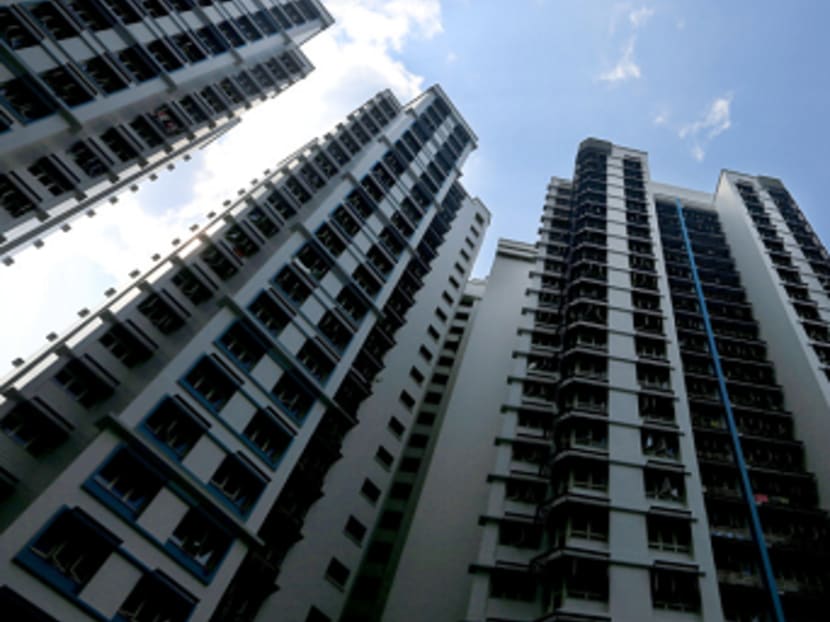Fall in housing, transport costs pulls CPI down again
SINGAPORE — Consumer prices fell for the 17th consecutive month in March, making it the longest decline on record, with a performance below economists’ expectations. The fall was due primarily to a significant decline in private road transport cost.

Accommodation costs continued to reflect the soft housing rental market, with a 3.2 per cent decline, similar to the previous month. TODAY file photo
SINGAPORE — Consumer prices fell for the 17th consecutive month in March, the longest decline on record, primarily due to a significant decline in private road transport costs. Economists do not
expect headline inflation to pick up in the near term, due to the ongoing slump in oil prices, the slowdown in Singapore’s growth momentum and the impact of earlier macro-prudential measures on housing and car purchases.
The All-Items Consumer Price Index (CPI) fell 1 per cent year-on-year in March, compared with the 0.8 per cent decline in February, data from the Monetary Authority of Singapore (MAS) and the Ministry of Trade and Industry (MTI) showed on Monday (April 25). Analysts in a Reuters poll had expected a 0.7 per cent decline.
“The duration of negative headline inflation this time surpassed the previous record of 16 months (October 1975 to January 1977). During the 1970s, prices in Singapore fell for a sustained
period of time due to high-base effects from the previous period of double-digit inflation,” said UOB economist Francis Tan.
However, Mr Tan emphasised that the current situation is not indicative of a “deflationary spiral”, as the decline in prices is largely due to administrative measures applied on accommodation and private road transport costs.
Last month, private road transport costs fell 5.9 per cent, compared with a 3.9 per cent decline in February. This was due mainly to a large drop in petrol pump prices on a year-ago basis, reflecting the higher base in March 2015 following the hike in petrol duties. Car prices also saw a sharper decline due to lower Certificate of Entitlement (COE) premiums compared with the same period last year.
Meanwhile, accommodation costs continued to reflect the soft housing rental market, with a 3.2 per cent decline, similar to the previous month.
“Core inflation remains in the positive growth region, unlike during the 2008/09 financial crisis, where core inflation fell for nine consecutive months due to a lack of consumer demand as well as corporate/business price-cutting in the aftermath of the global financial crisis,” added Mr Tan.
MAS Core Inflation — which excludes the cost of accommodation and private road transport — edged up to 0.6 per cent in March from 0.5 per cent the previous month, mostly on account of higher food inflation.
Going forward, economists expect headline inflation to remain in negative territory. “The negative inflation may persist in the coming months,” said DBS senior economist Irvin Seah, adding that the duration would depend primarily on oil prices. “We have seen oil prices bounce a bit recently, but the pace is fairly tepid. It is still hard to tell when will there be a rebound in the oil prices.”
Also, with the excess supply in housing stock and the associated downward pressure on rentals, the housing CPI index may continue to fall, noted Mr Seah.
“In addition, the Land Transport Authority had announced an increase in the supply of COE quota. This means a possible decline in private transport costs … Couple that with the low energy prices, a significant portion of the CPI basket will remain on a downward trend.”
Earlier this month, the MAS unexpectedly eased its monetary policy, guiding the Singapore dollar to a zero appreciation stance against those of its major trading partners, as growth in the first quarter stalled.
Singapore’s economic growth was flat on an annualised basis in the first quarter compared with the previous three months, slowing sharply from the 6.2 per cent expansion in the preceding quarter, advance estimates from MTI showed earlier this month.
“The growth slowdown has further compounded the disinflationary pressure. And this will likely become more pronounced in the coming months with an overhanging risk of a technical recession,” said Mr Seah.
The MAS and MTI project headline inflation to remain negative throughout this year, and average at minus 1.0–0.0 per cent for the whole year. For the full year, core inflation is likely to be in “the lower half of the 0.5–1.5 per cent forecast range, barring a sharp rise in global oil prices”, said MAS and MTI.






